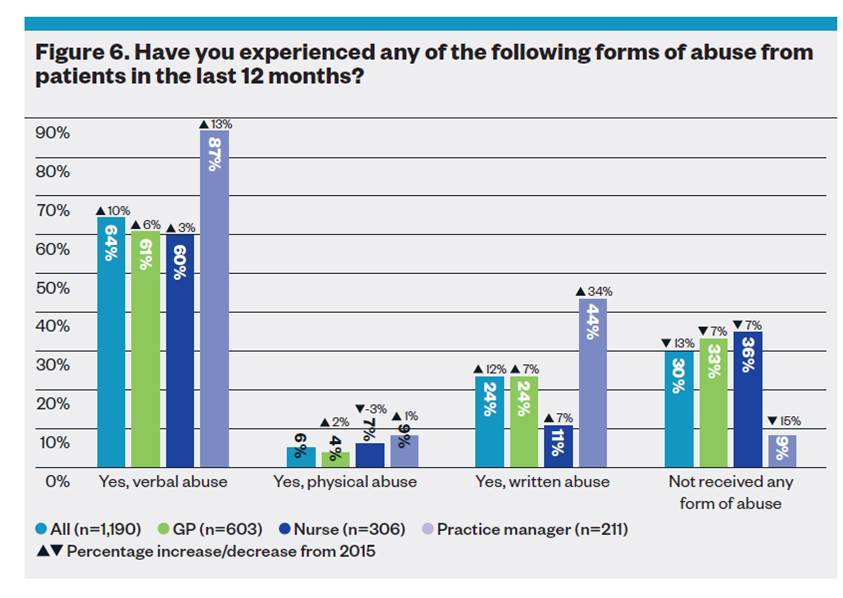Exclusive Rising numbers of GPs have experienced some form of verbal, written or physical abuse from patients in the past 12 months, an investigation has revealed.
The Primary Concerns report, from Pulse’s publisher Cogora, surveyed almost 2,000 primary care workers, including 600 GPs, finding that (66%) have experienced abuse – a rise of seven percentage points from the year before.
Broken down by type of abuse, some 4% of GPs have experienced physical violence from patients in the past 12 months, compared to 2% the previous year.
But in the same time period, well over half (61%) of GPs reported having experienced verbal abuse – an increase from 55% the year before.
Around a quarter of GPs (24%) also received written abuse, up from 17% in 2015.
But compared to other primary care staff GPs remain less affected by abuse than nurses and practice managers.
Practice managers were the most likely to have experienced all forms of abuse and just 9% said they had not experienced any form of abuse by patients in the last 12 months, a decrease from 26% in 2015.
There was a particular spike in written abuse directed at practice managers, including messages online and on social media, which increased from 10% to 44%.
The one slight sign of improvement was in physical abuse of nurses, with only 7% of nurses reporting they had experienced physical abuse in 2016 – down from 10% in 2015.
Across all primary care workers, the numbers experiencing abuse were reported as:
- Verbal – 64% (up from 54%)
- Physical – 6% (unchanged)
- Written – 24% (up from12%)
GP leaders said the findings were very ‘concerning’ and that NHS needed to be sure it ‘backed up’ staff who were faced with abuse of which there should be zero tolerance.
But, perhaps surprisingly, the researchers found that physical abuse had ‘no effect on morale’, although verbal abuse was rated higher and, again, most acutely felt by practice managers.
The leading contributor to low morale among primary care workers was cited as ‘unrealistic demand from patients’, followed by heavy workloads and ‘unfair criticism from politicians’.
The report said: ‘Physical abuse from patients was rated as having no effect on morale, whereas verbal abuse from patients seemingly had a greater impact. While this only had a moderate effect on GPs, it was rated more highly by practice managers – the professional group most likely to receive this form of abuse.’
One practice manager contacted in relation to the survey said they were subjected to abuse ‘on a weekly basis’.
They added: ‘I have no idea why they feel that this is appropriate behaviour. The message that keeps coming through is that they feel they are entitled to privileged treatment that they are not getting even though they have paid for it.’
GPC deputy chair Dr Richard Vautrey said: ‘It is very concerning that any patient feels that they can act in this way when GPs and their staff are doing their best to help and care for them.’
‘The NHS must not only adopt a zero tolerance policy to abusive behaviour but must also back up practice staff when they are subjected to these type of incidents.’
He added: ‘Whilst some GPs have been subjected to appalling levels of verbal and physical abuse they are aware that there remains a level of respect for them shown by patients which is not equally shown for their staff, in particular those on the front line such as reception staff and practice managers.’

Source: Cogora survey of 1,190 primary care workers including 600 GPs
Pulse October survey
Take our July 2025 survey to potentially win £1.000 worth of tokens













